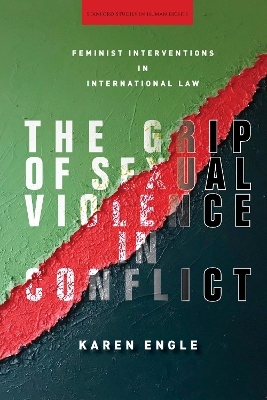
The Grip of Sexual Violence in Conflict
Feminist Interventions in International Law
Seiten
2020
Stanford University Press (Verlag)
978-1-5036-0794-1 (ISBN)
Stanford University Press (Verlag)
978-1-5036-0794-1 (ISBN)
Contemporary feminist advocacy in human rights, international criminal law, and peace and security is gripped by the issue of sexual violence in conflict. But it hasn't always been this way. Analyzing feminist international legal and political work over the past three decades, Karen Engle argues that it was not inevitable that sexual violence in conflict would become such a prominent issue.
Engle reveals that as feminists from around the world began to pay an enormous amount of attention to sexual violence in conflict, they often did so at the cost of attention to other issues, including the anti-militarism of the women's peace movement; critiques of economic maldistribution, imperialism, and cultural essentialism by feminists from the global South; and the sex-positive positions of many feminists involved in debates about sex work and pornography. The Grip of Sexual Violence in Conflict offers a detailed examination of how these feminist commitments were not merely deprioritized, but undermined, by efforts to address the issue of sexual violence in conflict. Engle's analysis reinvigorates vital debates about feminist goals and priorities, and spurs readers to question much of today's common sense about the causes, effects, and proper responses to sexual violence in conflict.
Engle reveals that as feminists from around the world began to pay an enormous amount of attention to sexual violence in conflict, they often did so at the cost of attention to other issues, including the anti-militarism of the women's peace movement; critiques of economic maldistribution, imperialism, and cultural essentialism by feminists from the global South; and the sex-positive positions of many feminists involved in debates about sex work and pornography. The Grip of Sexual Violence in Conflict offers a detailed examination of how these feminist commitments were not merely deprioritized, but undermined, by efforts to address the issue of sexual violence in conflict. Engle's analysis reinvigorates vital debates about feminist goals and priorities, and spurs readers to question much of today's common sense about the causes, effects, and proper responses to sexual violence in conflict.
Karen Engle is the Minerva House Drysdale Regents Chair in Law at the University of Texas at Austin, where she founded and co-directs the Bernard and Audre Rapoport Center for Human Rights and Justice. She is the author of The Elusive Promise of Indigenous Development: Rights, Culture, Strategy (2010), which received the APSA Human Rights Section Best Book Award.
| Erscheinungsdatum | 16.02.2019 |
|---|---|
| Reihe/Serie | Stanford Studies in Human Rights |
| Zusatzinfo | 2 halftones, 2 tables, 4 figures |
| Verlagsort | Palo Alto |
| Sprache | englisch |
| Maße | 152 x 229 mm |
| Themenwelt | Recht / Steuern ► EU / Internationales Recht |
| Recht / Steuern ► Öffentliches Recht ► Verfassungsrecht | |
| Sozialwissenschaften ► Ethnologie | |
| Sozialwissenschaften ► Politik / Verwaltung | |
| Sozialwissenschaften ► Soziologie | |
| ISBN-10 | 1-5036-0794-1 / 1503607941 |
| ISBN-13 | 978-1-5036-0794-1 / 9781503607941 |
| Zustand | Neuware |
| Haben Sie eine Frage zum Produkt? |
Mehr entdecken
aus dem Bereich
aus dem Bereich
Buch | Hardcover (2024)
C.H.Beck (Verlag)
75,00 €


